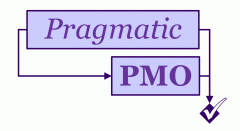Overview
- The book aims to illustrate how knowledge management (KM) contributes to successful project work. The authors present KM as an integral part of project work and explain it using KM principles and fundamentals that apply anywhere.
- Hidden KM is exposed, myths are debunked and practical guidance explains how to build KM into projects and portfolios.
- The aim is to help project professionals, sponsors, PMO members and others who can make a difference manage knowledge more effectively in project environments. Managing Knowledge in Project Environments offers everyone involved in project work a definitive short guide to the subject.
What’s inside
- The book starts somewhat worryingly by telling us that there is no universally agreed definition of what knowledge is, never mind what knowledge management is and how to do it well(!). However it does describe some features of knowledge, and points out that everyone practices knowledge management (at least informally) whenever we ask for or give advice.
- The book mentions several times that problems arise from what it calls “Thing thinking” – that is, characterising knowledge as a single truth or Thing that can be possessed and passed from place to place or person to person. In reality, this form of knowledge is incomplete – there is more bound up in groups, the way that people interact socially, and the way that people do things.
- It explains that knowledge can be codified (written down) to make it easier to share, but at that point it becomes information, and people need to use their own knowledge to understand it. This information and its management is important, but is only a part of knowledge management.
- The book says that knowledge management cannot be reduced to a simple, neat process or model, but instead requires experimentation, feedback, adaptation and iteration.
- I approach a book like this looking for answers to the question “how can I be better at my job?”, and was concerned from the somewhat philosophical start that the book was essentially going to spend its entire contents saying “well, it depends…”, but I needn’t have worried, as the book contains several very useful tables, including advice along the lines of “IF you want this sort of outcome, THEN try these kinds of activities”
Some of my favourite take-aways
Amongst the ideas presented, these resonated with me:
- Knowledge can be “sticky” and get caught up (on boundaries between technical professions, or between project teams and business as usual) when you want it to flow. It can also be “leaky”, and (due to social ties and forgetfulness) can get out into places you didn’t want it to go.
- Adults learn best when they need to know something (demand driven), not when someone else wants to share something (supply driven). Most project management information management activities (lessons learned reviews, databases, best practice manuals) are supply driven.
- Projects benefit from having different working environments for knowledge creation (creating knowledge about the ‘why’ and the ‘how’ of the project – benefits from social activities to create high trust relationships) and using existing knowledge (benefits from order, control and standardized procedures), so provide what the project needs at the stage it’s at.
- Implementing KM on a single project is inefficient, but that may be all that’s possible, and it can help to inspire others.
- The best time to start doing KM on a single project is before the project starts. Adding in KM at the later stages won’t fix KM problems that are already baked in (or left out), but it may help to increase the chances of success.
- The following ‘symptoms’ indicate a need for portfolio KM:
- Repeated reinvention of wheels / repeating the mistakes of the past.
- Tendency to copy previous solutions rather than create new ones.
- Knowledge boundaries (within project teams, between project teams and BAU).
- KM needs to be embedded in day to day work (in the flow) as much as possible; if people have to make a special effort to do KM, then it won’t happen
The Verdict
- The book is aimed at project practitioners who are looking to transform their practice and create more effective and efficient projects.
- The book does not provide recipes that can be copied. Rather it educates the reader in some fundamental principles, and makes some practical suggestions on how these could be applied in a project context.
- At an RRP of £30 for over 150 pages, this book contains enough “aha!” moments to be well worth the cover price.
- Recommended for anyone wanting to improve the way that their projects or portfolios create and use knowledge, with the aim of delivering better project outcomes.
| Full title: | Managing Knowledge in Project Environments (Fundamentals of Project Management) |
| Authors: | Judy Payne, Eileen J Roden, Steve Simister |
| Publisher: | Routledge; 1 edition (30 May 2019) |
| ISBN: | 978-1472480279 |
| Pages: | 153 |
| RRP: | £30.00 (paperback) |
| Rating: | ⭐⭐⭐⭐ |


